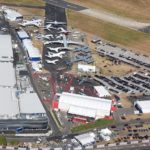Professor Brian Cox spoke to FINN editor Hazel King about how the Brooklands Innovation Academy connects young people with scientists, technologists, engineers and mathematicians from leading businesses to inspire the future workforce.
The Innovation Academy is part of the National Science Summer School programme, co-founded by Professor Cox, Lord Andrew Mawson OBE and Well North Enterprises, which was set up in 2012 in a bid to help a failing school in Tower Hamlets, London.
“The idea was that the school was in the shadow of the city, but nobody in that school had any connection with the city – the financial institutes or the universities,” Professor Cox explained. “The National Science Summer School Programme was created to inspire the students, with scientists and engineers coming in to talk about their work, but it was also about was making connections. For people whose family have no connection with engineering or science or academia, it is important to create connections so they can see there is a pathway for them into those sectors.”
Following your dreams
As a young boy who grew up in Oldham in the north of England with no connections to the world of physics, how did he end up becoming a famous physicist and astronomer? “When I was young, I loved astronomy. At school, they steered me away from that because in the 1980s if you said to a careers teacher that you wanted to do astronomy, they wouldn’t have known what you were talking about!” he said.
“I grew up in Oldham, which was surrounded by engineering companies, and it was a natural progression to go into that sector, but I accidentally joined a band [D:Ream] and did music for a while. By the time I was 23 I had my own mind and the power to make decisions for myself, so I then went to do physics and astronomy. I wasn’t really focused on whether there was a career path for me in astronomy, I just really wanted to study it. And there is an important message there – people should be encouraged to do what they enjoy, and if you do that then you will end up good at it.”
Inspiring the next generation
Events such as the Innovation Academy provide a hands-on experience for young people to discover what they enjoy, and the almost unlimited career paths and opportunities available to them.
“As we continue to develop more technologies, the number of different avenues into engineering, for example, becomes broader,” Professor Cox enthused. “For example, my research into black holes might not seem relevant to engineering but it actually has an intimate connection with quantum computing. So suddenly you have this subject that is ultimately about the fundamental nature of reality itself, which now has an engineering application.
“I think that whatever our imagination delivers in term of possible careers, the rate of innovation is so great that the range of careers will continue to grow.”
As that rate of innovation continues to increase, especially in industries such as aviation and space, the challenge of growing the workforce will also grow. “If you say to a student today, do you want to build a space craft for a living, a lot of them will say yes,” Professor Cox explained. “The fact that there are vacancies – we haven’t got enough spacecraft engineers in the country – is an astonishing thing. You could walk into a career building satellites because there aren’t enough people to do the job. In aviation, the development of supersonic airliners is a growing sector, and we have a shortage of people who want to build those new aircraft.
“The idea of the Innovation Academy and the National Science Summer School programme is to integrate industries with schools and provide feedback into those schools about what industry needs, so we can build the workforce of the future.”
Image: JP Bland for Brooklands Museum

